What is the full form of SWAYAMSWAYAM: Study Webs of Active-Learning for Young Aspiring MindsSWAYAM stands for Study Webs of Active-Learning for Young Aspiring Minds. To provide a coordinated stage and free entry to web courses, covering all advanced education, High School, and skill sector courses, the then Ministry of Human Resource Development (M.H.R.D.) and now Ministry of Education, Government of India, launched the S.W.A.Y.A.M. initiative under Digital India. S.W.A.Y.A.M., "Study Webs of Active-Learning for Young Aspiring Minds," is an abbreviation for "self" in Sanskrit. 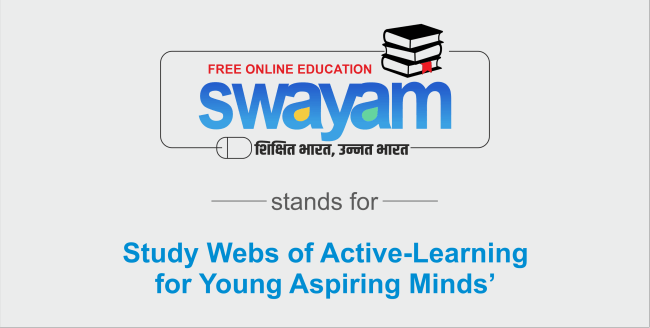
With the assistance of Microsoft, S.W.A.Y.A.M. was created collaboratively by the M.H.R.D. (Ministry of Human Resource Development) and A.I.C.T.E. (All India Council for Technical Education). The current S.W.A.Y.A.M. platform, which can accommodate 2,000 courses, was created by the Ministry of Education, N.P.T.E.L., and I.I.T. Everyone has free access to the Platform, which hosts classes from ninth grade through post-graduation. It makes it possible for professors and staff at institutions with government funding, including I.I.T.s, I.I.M.s, I.I.S.E.R.s, etc., to instruct students. S.W.A.Y.A.M. is a government program in India that offers numerous college and university students educational opportunities. FunctionalityMOOC learning resources are operated in various ways and structures by S.W.A.Y.A.M. S.W.A.Y.A.M. comprises four components or quadrants for learning:
Direct instruction is done in the first quadrant. Therefore, there isn't much further work for the students to do. It could consist of instructional videos, cartoons, PowerPoint presentations, podcasts, and more. All these things depend on the subject and the instructor's teaching approach. The second quadrant contains electronic content, such as e-books, images, case studies, open source content, references, additional reading materials, and so forth. Clearing up pupils' questions is the focus of the third quadrant. A discussion forum is a part of it, which implies that the students can engage with other students and instructors to explain their doubts. Any student or faculty member can respond to a student's question in the discussion forum, which functions as a doubt counter. 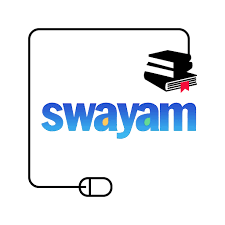
Self-assessment is done in the fourth quadrant to determine what a pupil has learned and whether they are qualified to receive a certificate. MCQs, S.A.Q.s, L.A.Q.s, etc., could all be included in the testing. Frequently Asked Questions (F.A.Q.s) and their responses are also included in the fourth quadrant to help students understand frequent misunderstandings. According to University Grants Commission (U.G.C.), universities should play a significant role in promoting S.W.A.Y.A.M. courses among their students and the University, so that they can benefit from MOOCs on a more extended and comprehensive basis. Financial TransferThe government of India has approved all of S.W.A.Y.A.M.'s courses. All of the courses are recognized throughout the nation. On July 19, 2016, the U.G.C. published the Credit Framework for Online Learning Courses through S.W.A.Y.A.M. 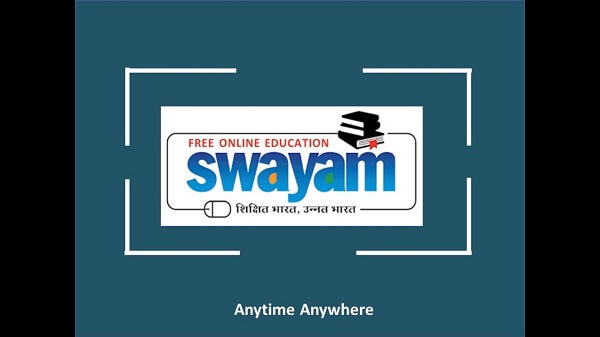
Regulations in 2016, in the Indian Gazette, outlined the definition of credit transfer for S.W.A.Y.A.M. courses. According to the U.G.C. guideline, universities must amend their rules and regulations to include clauses allowing for credit mobility and MOOCs on the S.W.A.Y.A.M. platform. Upon completing the course requirements, certificates of degrees and diplomas will be awarded, and those certifications will be credited for academic credits. According to the U.G.C.'s present guidelines, only 20% of the courses for degree-level programs are constrained. CollaborationsThe I.I.T.s and I.I.S.C. collaborated on N.P.T.E.L. N.P.T.E.L., providing online certifications and courses in various subject areas. To offer certificate programs in various universities across India, N.P.T.E.L. has established a structure known as NPTEL-local chapters. One college faculty member will serve as the local chapter's single and single point of contact (S.P.O.C.). Two more sections are run under the SWAYAM-NPTEL webpage, including a timeline, a list of current local chapters, ratings for local chapters, etc. Additionally, another division displays news from regional chapters, i.e., regional chapter colleges, and institutions. There is a different Coordinator/S.P.O.C. for each Local Chapter. Swayam PrabhaSwayam Prabha is a learning platform launched by the M.H.R.D. and accessible round-the-clock through 34 (at first 32) D.T.H. channels. This effort offers educational television programming across several time zones. Like the S.W.A.Y.A.M. online platform, the content providers are N.P.T.E.L., I.I.T.s, U.G.C., N.C.E.R.T., etc. One of the world's largest tremendous Open Online Courses platforms, S.W.A.Y.A.M., offers free online courses in various areas from high school to higher education and skill-based courses to ensure that every student may benefit from educational materials delivered via I.C.T. The S.W.A.Y.A.M. MOOC Platform was created in-house by the A.I.C.T.E. in 2016 to enable the hosting of online courses that anyone could access anywhere, at any time, free of charge. This was done to achieve the three guiding principles of education policy: Quality, Equity and Access The S.W.A.Y.A.M. courses are divided into 4 quadrants:
AICTE-SWAYAM Team offers S.W.A.Y.A.M. Platform Help Desk support via email and phone to handle end-user questions and service requests. Who Creates Swayam's Content?Swayam's content is prepared by AICTE. The All-India Council for Technical Education (A.I.C.T.E.) was established in November 1945 as a top-level national advisory organization to review technical education facilities and advance coordinated, integrated national development. And to make sure of the same, A.I.C.T.E. was given the following powers, as stated in the National Policy of Education (1986):
A National Working Group was established by the Indian government's Ministry of Human Resource Development to examine the function of A.I.C.T.E. in developing technical institutions, upkeep standards, and other relevant issues. According to the Working Group, A.I.C.T.E. should be given the requisite statutory authority to increase its effectiveness, necessitating reorganizing and reinforcing it with the required operating systems and infrastructure. With a view to proper planning and coordinated development of a technical education system across the nation, the promotion of qualitative improvements to such education about planned quantitative growth, regulation, and proper maintenance of norms and standards, the All-India Council for Technical Education (A.I.C.T.E.) The act was established in the technical education system and for related issues. The Minister for Human Resource Development, Government of India, served as Chairman of the Council for the first five years following the organization's founding in 1988, following the stipulations of the A.I.C.T.E. Act (1987). On July 2, 1993, they chose the first full-time Chairman, reconvening the Council in March 1994 for a three-year term. On July 7, 1994, the Executive Committee was reconstituted, and the All-India Board of Studies and Advisory Boards were established for the 1994-95 academic year. The Ministry of Human Resource Development's regional offices in major cities were transferred to A.I.C.T.E. The personnel employed there was also deputed to the Council on foreign service. 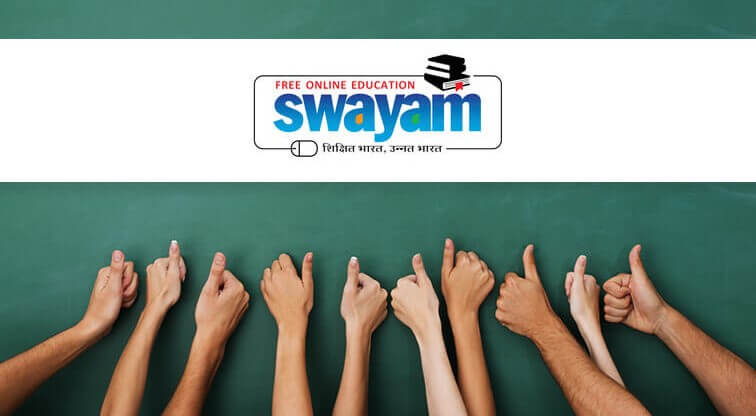
These seats served as regional Committee administrations for the four provinces. On July 27, 1994, three new provincial Committees were also constituted, with secretariats in Bangalore, Bhopal, and Chandigarh, respectively, serving the southwest, central, and northwest regions. On March 8, 2007, they informed the South-Central region's regional committee with a Secretariat in Hyderabad. There is news in October 12, 2020 that Microsoft and A.I.C.T.E. in collaboration with SWAYAM to Train Students in Future Technologies in New Delhi. To equip students and teachers with future capabilities, the All-India Council for Technical Education (A.I.C.T.E.) declared that it had partnered with Microsoft. More than fifteen hundred Microsoft course modules are made freely available to students and educators as part of this agreement fee through the e-learning site of A.I.C.T.E.'s E.L.I.S. The E.L.I.S. platform is connected with Microsoft's learning resource hub, Microsoft Learn, to give students access to individualized learning pathways and resources. These resources cover a wide range of technologies, including A.I., IoT, computer science, and cloud computing. On March 25, 2020, it was published by SWAYAM to utilize the NEAT Platform from A.I.C.T.E. to learn from home. On October 8, 2019, Engineering students contributed to the growth of the villages in Agra. Students from engineering institutes will assist the villages near Agra to find solutions to their issues and work toward their development. Each engineering college has been requested to adopt at least five villages to benefit overall development. Colleges have launched a survey to locate the communities. A.I.C.T.E. advises engineering colleges to permit student entrepreneurs with intermittent attendance to take exams. A.I.C.T.E. requires engineering colleges and technical institutions to let student entrepreneurs take exams even if their attendance is spotty. The institutions have also been requested to look into allowing student entrepreneurs to live on campus and allowing them to use a semester break to work on their enterprises. On September 26, 2019, a campaign to plant trees was very successful. A recent Tree Plantation and Swachhata Pakhwada was organized by the National Service Scheme (N.S.S.) Unit of the Gaikwad-Patil Group of Institutions in the village of Mohegan, Gurgaon, Shirur, Bothali, and Dongargaon of the Gram Panchayat officers. I.I.T. Guwahati collaborates with SWAYAM and A.I.C.T.E to train students in Kashmir. To offer internships to students from Jammu and Kashmir, the All India Council for Technical Education (A.I.C.T.E.) and the Indian Institute of Technology, Guwahati (IIT-G) have signed a Memorandum of Understanding (MoU). Through this partnership, IIT-G will put into practice the Prime Minister's Special Scholarship Scheme for Jammu and Kashmir Students, which aims to give Jammu and Kashmir students studying in higher education institutions more exposure. In 2020, October 1, The Prime Minister's Scholarship Program for J&K students is implemented at I.I.T. Guwahati. The All-India Council for Technical Education (A.I.C.T.E.), SWAYAM and the Indian Institute of Technology, Guwahati (I.I.T.G.) has the Prime Minister's Special Scholarship Program for Jammu, and Kashmir students put into effect. A Memorandum of Understanding (MoU) has been inked to this effect, opening the door for exposing young people from Jammu and Kashmir to the country's superior academic culture. Roles and Responsibilities of AICTEIt is responsible for the design and development of S.W.A.Y.A.M., a medium for Enormous Available Online Courses (MOOCs), following the M.H.R.D.'s O.M. No.8-26/2014-TEL (Pt.), dated March 21, 2016. They are responsible for creating the S.W.A.Y.A.M. Platform, which combines experience from several fields with cutting-edge technology, audio-video, and multimedia to harness multiparty involvement in education effectively. They are in charge of acquiring the materials needed for the S.W.A.Y.A.M. Platform's seamless operation and ongoing operationalization. They are responsible for increasing the necessary reach and access to high-quality education at competitive economies of scale to change India's educational performance dramatically. They are also responsible for providing the greatest amount of online courses possible to meet the demand free of charge to students, save for a nominal fee to be collected for certification after completing the Course, of students from Class IX up to Post Graduate levels. A.I.C.T.E is accountable for realizing the goal of providing 10,000 online courses to 30 million students and learners and are responsible for developing e-content on Courses from School Secondary Level to Postgraduate, spanning all disciplines, to be made available on the S.W.A.Y.A.M. Platform through P.I.s and National Coordinators. They are responsible for developing online and cross-disciplinary courses for the S.W.A.Y.A.M. Platform to enable self-paced learning in various subjects, including yoga, the Goods and Services Tax, the Economic Survey, skill development, and panchayat raj, from various Indian government departments, ministries, autonomous organizations, and institutions. 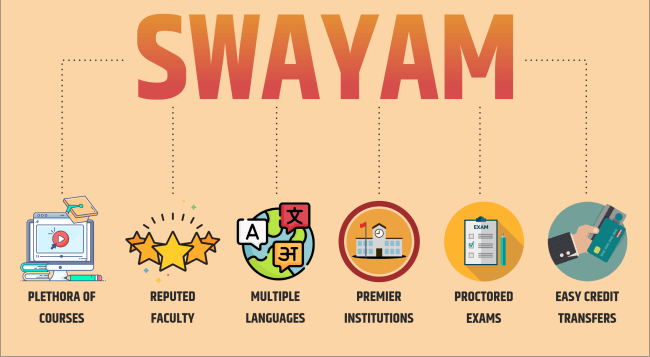
They are in charge of new curriculum-based courses (Medicine, Law, Humanities and Social Sciences, Agriculture, Commerce, Management, and Inter-Disciplinary Areas). They are responsible for enabling students to either pursue an appropriate higher education program or become employable in the industry. With the introduction of MOOCs, there has been a significant paradigm change in higher education, from the development of cognitive and non-cognitive abilities inside of a classroom to technology-based online learning, which is a flexible to everyone, anytime in any platform. By expanding reach and access to high-quality education at reasonable prices, S.W.A.Y.A.M., the India Chapter of MOOC, is well-positioned at this point to bring about dramatic changes in educational results. S.W.A.Y.A.M. has both a technological and pedagogical component. It has been crucial in bringing together partners in education and technology nationally under a single umbrella. It is a significant step toward knowledge expansion and the democratization of education. ControversiesBased on student interest, it is said by the Director of A.I.C.T.E., SWAYAM's Content partner said that Sanskrit can be taught. Anil D. Sahasrabudhe, the Chairman of the A.I.C.T.E., downplayed the debate around the use of Sanskrit in technical institutes in Chennai. A dispute started when an Anna University department required BTech students to take Philosophy, which includes Bhagavad Gita and Upanishad chapters. Political parties expressed outrage, claiming that it amounted to imposing Sanskrit. The University clarified that it would introduce changes to make students decide for themselves.
Next TopicFull Form
|
 For Videos Join Our Youtube Channel: Join Now
For Videos Join Our Youtube Channel: Join Now
Feedback
- Send your Feedback to [email protected]
Help Others, Please Share










